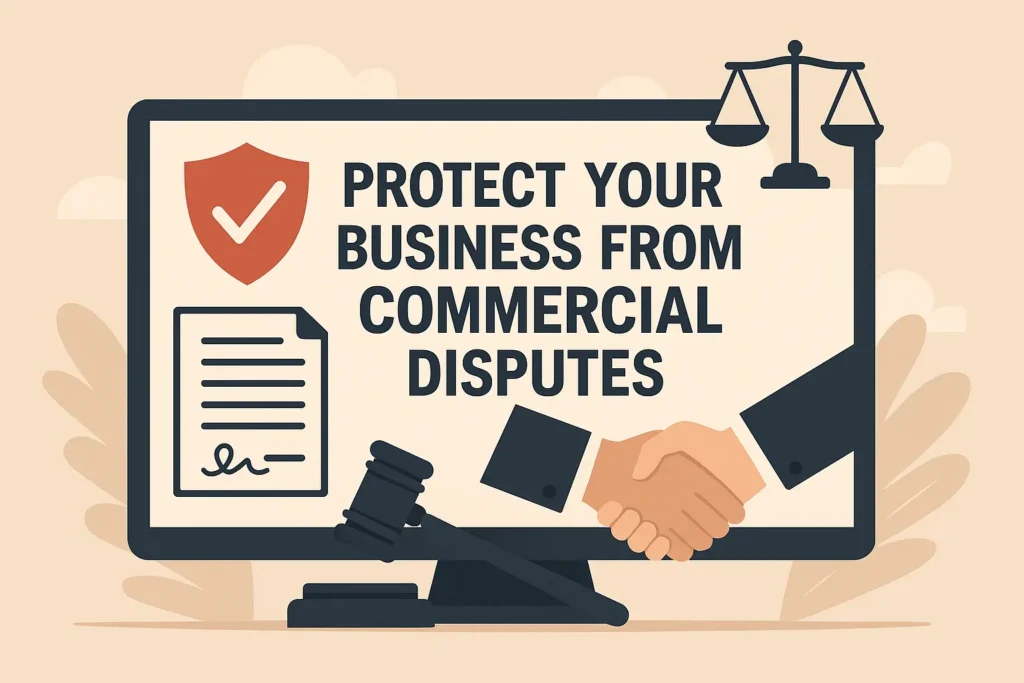
Morocco offers a strategic gateway for trade and investment in North Africa. However, doing business in any foreign market involves legal risks — especially the risk of commercial disputes.
Whether you’re entering into a partnership, signing a distribution agreement, or selling goods to a Moroccan company, it’s crucial to understand how to avoid disputes and how to handle them legally if they arise.
1. Common Causes of Commercial Disputes in Morocco
Some of the most frequent issues include:
- Late or non-payment
- Breach of contract
- Delivery delays or quality issues
- Intellectual property disputes
- Vague or poorly defined contractual terms
2. Preventing Disputes: Legal Best Practices
✔️ Draft Clear and Detailed Contracts:
Ensure that all contracts include:
- Payment terms and deadlines
- Penalties for non-performance
- Jurisdiction and applicable law
- Dispute resolution method (court or arbitration)
✔️ Include an Arbitration Clause:
Adding an arbitration clause can save time and money, especially for cross-border deals.
Morocco recognizes both domestic and international arbitration.
✔️ Conduct Due Diligence:
Before signing any agreement, investigate the partner’s financial and legal background.
3. What to Do If a Dispute Arises
📌 Amicable Settlement:
- Send a formal notice (via bailiff or legal letter)
- Attempt negotiation or mediation before escalation
⚖️ Legal Action in Moroccan Courts:
- File a claim in the competent commercial court
- Consider conservatory seizure (saisie conservatoire) to secure your claim
🔐 Arbitration:
- If an arbitration clause exists, proceed through the designated arbitration center (e.g. Casablanca International Mediation & Arbitration Center – CIMAC)
4. Enforcing Judgments in Morocco
After obtaining a favorable judgment:
- You must apply for an execution order (exequatur)
- Enforcement is usually done through asset seizure, bank garnishment, or property auction
Conclusion
Doing business in Morocco can be highly rewarding — but preparation is key.
Having solid legal contracts, clear dispute resolution clauses, and expert legal support can protect your company from costly litigation.
At Legal Morocco, we guide local and international businesses through every step of their commercial relationships — from contract drafting to arbitration and court proceedings.
✅ Need Legal Support in Morocco?
We offer specialized services in:
- Commercial contract review
- Cross-border dispute resolution
- Debt collection and enforcement
- Arbitration and litigation representation
FAQ
What are the most common types of commercial disputes in Morocco?
The most common disputes involve breach of contract, unpaid invoices, failure to deliver goods or services as agreed, distribution conflicts, and intellectual property issues. These often occur due to unclear agreements or lack of legal documentation.
Is it necessary to have a written contract when doing business in Morocco?
Yes. A written contract is highly recommended as it serves as the primary legal proof in case of a dispute. It should include clear terms regarding obligations, deadlines, payment, jurisdiction, and dispute resolution methods.
Can I use international arbitration for disputes in Morocco?
Yes. Morocco recognizes international arbitration under the New York Convention. Many foreign companies include arbitration clauses in their contracts to avoid local litigation. Popular arbitration centers include CIMAC (Casablanca) and international bodies like the ICC.
How long does it take to resolve a commercial dispute in Moroccan courts?
The duration depends on the complexity of the case. On average, a commercial lawsuit in Morocco may take 6 months to 2 years. Arbitration can be faster if agreed upon in the contract.
Can a foreign company enforce a court judgment in Morocco?
Yes, but it must go through an exequatur process to make the foreign judgment enforceable in Morocco. If the judgment is Moroccan, enforcement can be immediate via court bailiffs, including asset seizure or bank account garnishment.
What legal steps should I take if my Moroccan partner stops paying?
You should:
Send a formal notice via a Moroccan bailiff.
Attempt negotiation or mediation.
Initiate legal proceedings in court or through arbitration, depending on your contract.
Legal Morocco can help you navigate this process and secure payment.
To avoid legal disputes, it’s highly recommended to consult professionals for your agreements. Our contract services in Morocco ensure your documents are both enforceable and tailored to your needs.